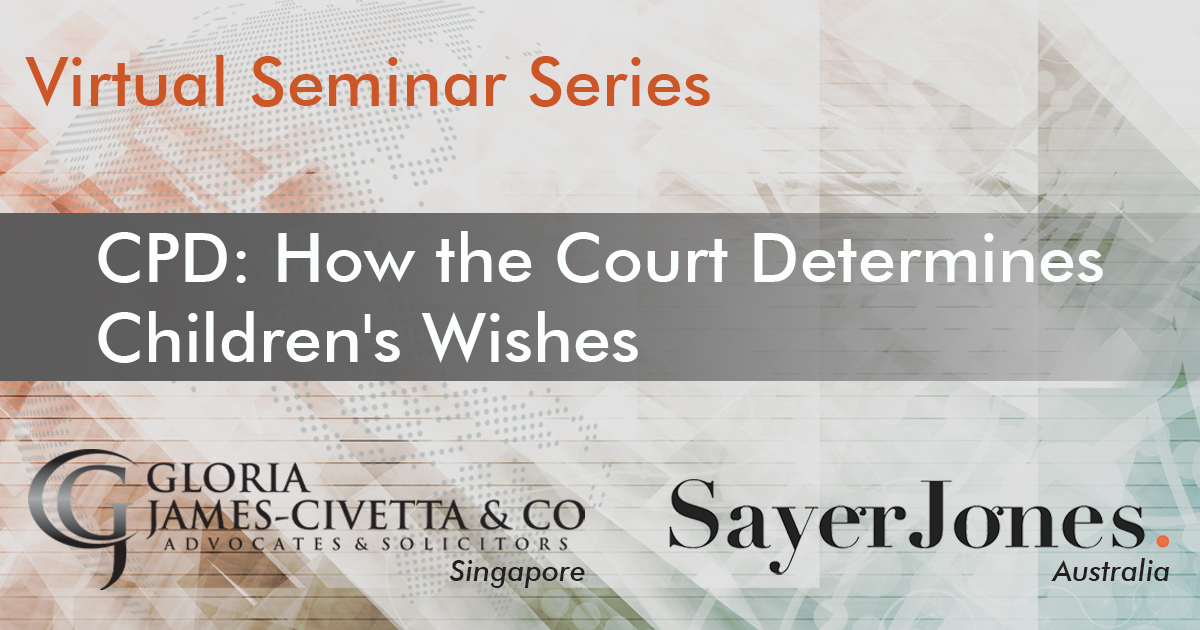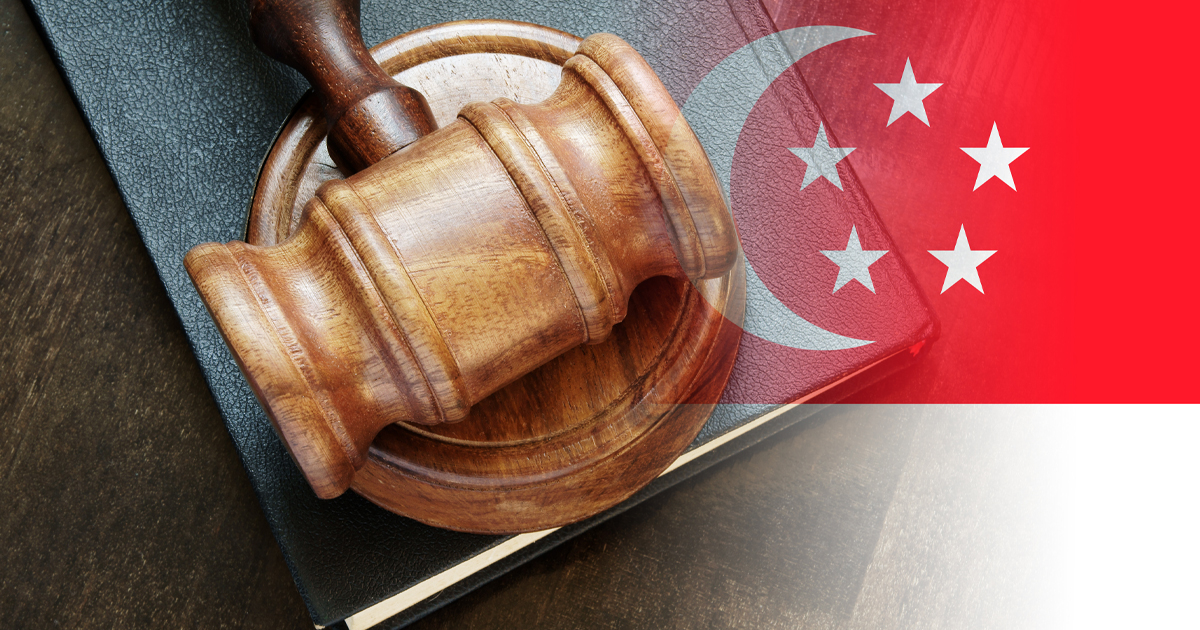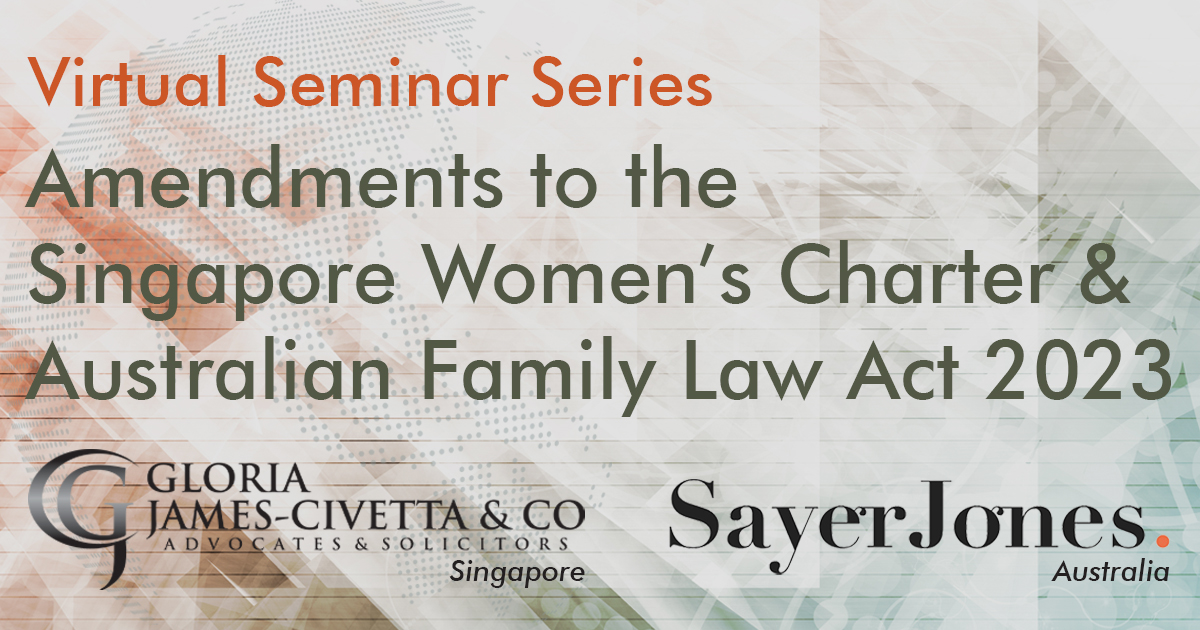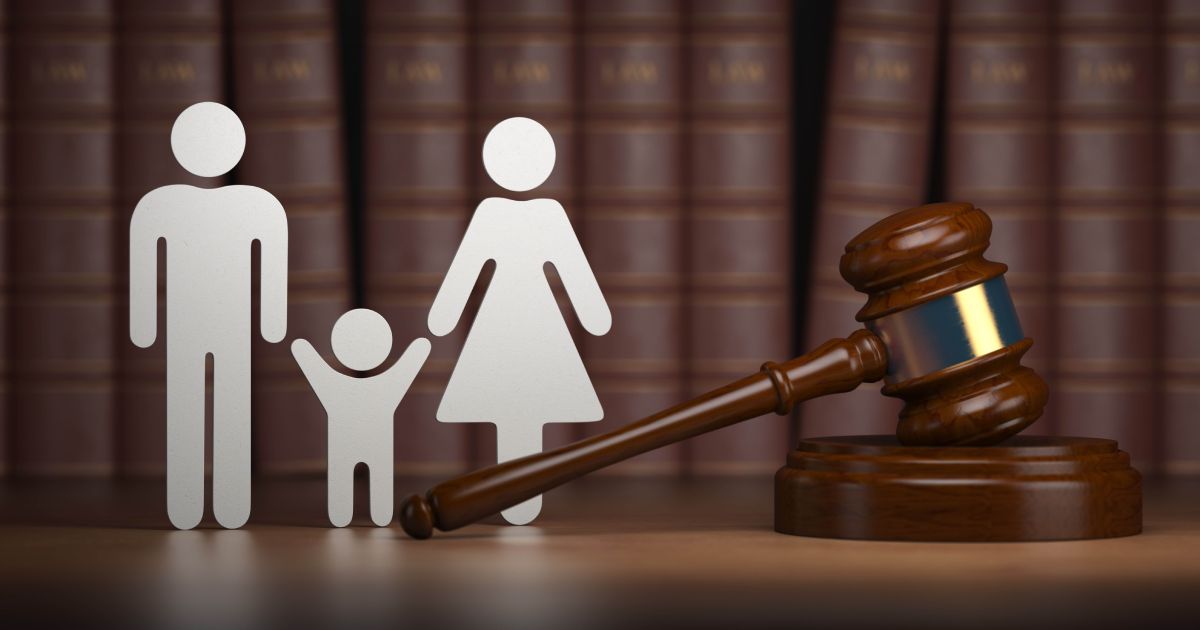In a joint session with Sayer Jones on Continuing Professional Development (CPD), our trainee lawyers, Noelle Teoh, Arika Ong, and a Senior Associate from Sayer Jones, Laura Snell presented the topic: How the Court Determines Children’s Wishes.
It was an insightful look into the perspectives of Australia and Singapore and how each Court determines what’s in the child’s best interests.
CPD is a way to track and document the skills, knowledge, and experience acquired through work, both formally and informally. Essentially, it records experiences, learnings, and applications.
The presentation is part of our ongoing International Family Law Alliance with Sayer Jones.
Starting Point
Article 12 United Nations Convention on the Rights of the Child:
- States Parties shall assure to the child who is capable of forming his or her own views the right to express those views freely in all matters affecting the child, the views of the child being given due weight in accordance with the age and maturity of the child.
- For this purpose, the child shall in particular be provided the opportunity to be heard in any judicial and administrative proceedings affecting the child, either directly, or through a representative or an appropriate body, in a manner consistent with the procedural rules of national law.
Section 125(2) of the Woman’s Charter:
- In deciding in whose custody, or in whose care and control, a child should be placed, the paramount consideration is to be the welfare of the child and subject to this, the court is to have regard
- to the wishes of the parents of the child; and
- to the wishes of the child, where he or she is of an age to express an independent opinion.
Ascertaining the Child’s Wishes
- Testifying in court
- Obtaining information from parents, lawyers, social workers or mental health professionals
- Social Welfare Report
- Custody Evaluation Report
- Access Evaluation Report
- Assisted Access Report
- Child Representative
- Judicial Interviews
What is Judicial Interview (“JI”)?
- Interviews conducted by judges with the children of parties involved in matrimonial disputes.
- JI may be conducted by a judge’s own motion without any applications from either party.
- Judge-led approach of JI empowers the judges to proactively guide and direct proceedings and minimises the negative impact of proceedings on parents and their children.
How are JIs Conducted?
- JI should not be conducted in a mechanical fashion and there are no general guidelines to be followed.
- Judges to be aware of this procedure and be prepared to implement it to facilitate his or her decision making.
- Some helpful considerations are:
- Asking open ended questions
- Avoid leading questions which may cause the child to choose between parents
- Considering the age and maturity of the child
- Whether the child had asked to speak to a Judge or was pressured by parents to do so
- Being conscious of possible loyalty conflict, guilt or possible parental alienation
What are Some Questions Asked During JIs?
| Older Child | Younger Child |
|---|---|
| Share with me your relationship with your father/mother? | Who is your favourite person? |
| How much time do you spend with your father/mother? | Where do you like to stay? |
| Why not on the relationship with your father/mother? | How are you doing? |
| What are your thoughts about the family situation? | How do you feel? |
| How is the present living arrangement been for you? |
Concerns About Conducting JIs With Children
- Judge may not necessarily be well trained
- Lack of trust between the judge and the children
- Potential coaching by the children’s parents
- Involving children in the adversarial nature of court proceedings
Balancing the Concerns with the Utility of JIs
- Children are able to have their opinions heard through JIs, and this in turn may help them move on
- Parties are thought to be sufficiently wise not to coach/prime their children and that they would be advised against the same
- Courts are confident that judges would be sufficiently astute to discern whether children were coached or primed
- Judges can equip themselves with the necessary skills to conduct an effective JI
Suitability of JI
- JI must be for the children’s welfare, in light of the circumstances of the case
- Children must be matured enough to convey their views independently
- JIs are only one out of the various sources in which courts can obtain useful information to ascertain the child’s wishes
- Judges can place appropriate weight on the children’s views based on their understanding of any limitations/reservations or usefulness of these views
Case law
| Case | Factor: Age and Maturity to Express an Independent Opinion | Was JI conducted? |
|---|---|---|
| TTF v TTG [2016] SGFC 124 | Child was 14 years old
Court was of the view that the child could express an independent opinion |
JI conducted |
| UNQ v UNR [2020] SGHCF 21 | Children were 9 and 7 years old respectively
Judge found that they were able to comfortably express themselves |
JI conducted |
| WAA v VZZ [2022] SGHCF 19 | Judge interviewed the children aged 7 and 5 years old | JI conducted |
| AZB v AZC [2016] SGHCF 1 | Children were mature enough to express their views on matters that impacted their lives | JI conducted |
| UPS v UPT [2018] SGFC 97 | Child is 10 years old and in Primary 4
Judge found that he was a precocious and intelligent child |
JI conducted |
| VAU v VAV [2019] SGFC 102 | Child was 7 years old
Judge found that child could not fully understand or accurately articulate his views on what would or would not be in his welfare Potential coaching |
JI not conducted |
| Case | Children’s wishes and attitude towards court processes | Was JI conducted? |
|---|---|---|
| AZB v AZC [2016] SGHCF 1 | There were indications that the children wished to speak to the judge. They were also mature enough to express their views
The judge found the JI to be very helpful |
JI conducted |
| UBQ v UBR [2022] SGHCF 13 | Although one of the children was 14 years old, he had previously expressed nervousness about being involved in proceedings in another matter
The judge did not see the need to further involve him in the matter by conducted a JI |
JI not conducted |
| Case | Coaching/Priming of the children | Was JI conducted? |
|---|---|---|
| VAU v VAV [2019] SGFC 102 | There were concerns that the child would have been coached by Husband to the exclusion of Wife | JI not conducted |
| WEI v WEJ [2022] SGFC 51 | The Court found that the mother must have believed that each of the children would express a desire to remain under her care and control
Thus, there would have been little purpose in conducting a JI as the Children would not be speaking with untainted minds |
JI not conducted |
| VII v VIJ [2020] SGFC 48 | There were allegations made by each party that the children have been triangulated in the parent’s disputes | JI not conducted |
| Case | Availability of Other Evidence /Suitability of other sources to ascertain Child’s wishes. | Was JI conducted? |
|---|---|---|
| VJN v VJO [2020] SGFC 61 | Court declined to interview the child as there were already existing independent reports and the court did not wish to subject the child to further interviews and questions. Court was also able to observe the child in video recordings | JI not conducted |
| WEI v WEJ [2022] SGFC 51 | There were detailed CER and DSSA reports depicting the children’s wishes
Thus, the court found that it was sufficient for it to view the children’s wishes through the lens of these professional reports |
JI not conducted |
| TWM v TWN [2021] SGHCF 25 | It was within the judge’s discretion on whether an interview should be conducted. In this case, Court had the benefit of a CER and SWR | JI not conducted |
| VII v VIJ [2020] SGFC 48 | A detailed CER had been rendered and hence the court found it unnecessary to involve the children again | JI not conducted |
Family Law Act 1975 (Cth) – Section 60CC
How a court determines what is in a child’s best interests
(2) The primary considerations are:
- the benefit to the child of having a meaningful relationship with both of the child’s parents; and
- the need to protect the child from physical or psychological harm from being subjected to, or exposed to, abuse, neglect or family violence.
(2A) In applying the considerations set out in subsection (2), the court is to give greater weight to the consideration set out in paragraph (2)(b).
Additional consideration
(a) any views expressed by the child and any factors (such as the child’s maturity or level of understanding) that the court thinks are relevant to the weight it should give to the child’s views;
(b) the nature of the relationship of the child with:
- each of the child’s parents; and
- other persons (including any grandparent or other relative of the child);
(c) the extent to which each of the child’s parents has taken, or failed to take, the opportunity:
- to participate in making decisions about major long-term issues in relation to the child; and
- to spend time with the child; and
- to communicate with the child;
(ca) the extent to which each of the child’s parents has fulfilled, or failed to fulfil, the parent’s obligations to maintain the child;
(d) the likely effect of any changes in the child’s circumstances, including the likely effect on the child of any separation from:
- either of his or her parents; or
- any other child, or other person (including any grandparent or other relative of the child), with whom he or she has been living;
(e) the practical difficulty and expense of a child spending time with and communicating with a parent and whether that difficulty or expense will substantially affect the child’s right to maintain personal relations and direct contact with both parents on a regular basis.
(f) the capacity of:
- each of the child’s parents; and
- any other person (including any grandparent or other relative of the child); to provide for the needs of the child, including emotional and intellectual needs;
(g) the maturity, sex, lifestyle and background (including lifestyle, culture and traditions) of the child and of either of the child’s parents, and any other characteristics of the child that the court thinks are relevant;
(h) if the child is an Aboriginal child or a Torres Strait Islander child:
- the child’s right to enjoy his or her Aboriginal or Torres Strait Islander culture (including the right to enjoy that culture with other people who share that culture); and
- the likely impact any proposed parenting order under this Part will have on that right;
(i) the attitude to the child, and to the responsibilities of parenthood, demonstrated by each of the child’s parents;
(j) any family violence involving the child or a member of the child’s family;
(k) if a family violence order applies, or has applied, to the child or a member of the child’s family–any relevant inferences that can be drawn from the order, taking into account the following:
- the nature of the order;
- the circumstances in which the order was made;
- any evidence admitted in proceedings for the order;
- any findings made by the court in, or in proceedings for, the order;
- any other relevant matter;
(l) whether it would be preferable to make the order that would be least likely to lead to the institution of further proceedings in relation to the child;
(m) any other fact or circumstance that the court thinks is relevant.
Aboriginal or Torres Strait Islander children
(6) For the purposes of paragraph (3)(h), an Aboriginal child’s or a Torres Strait Islander child’s right to enjoy his or her Aboriginal or Torres Strait Islander culture includes the right:
- to maintain a connection with that culture; and
- to have the support, opportunity and encouragement necessary:
- to explore the full extent of that culture, consistent with the child’s age and developmental level and the child’s views; and
- to develop a positive appreciation of that culture.
H & W (1995) FLC 92-598
“The wishes of children are important and proper and realistic weight should be attached to any wishes expressed by children…. As a matter of practical day-to-day experience, the problem in this area usually relates to the ascertainment of the wishes of the child and their interpretation and assessment in the face of conflicting evidence. Against that background the Court will attach varying degrees of weight to a child’s stated wishes depending upon, amongst other factors, the strength and duration of their wishes, their basis, and the maturity of the child, including the degree of appreciation by the child of the factors involved in the issue before the court and their longer term implications. Ultimately the overall welfare of the child is the determinant….
It appears to us that recent social forces have indicated that more realistic weight should be attached to the wishes of the children than may have been the practical realities in years past. But there is nothing new or surprising about that circumstance; the Family Law Act is fundamentally about the application of its general provisions in the light of changing social values”.
R and R (Children’s Wishes) 2000 FLC 93-000 Full Court cited with approval the decision of H v W noting that:
There are many factors that may go to the weight that should be given to the wishes of Children and these will vary from case to case and it is undesirable and indeed impossible to catalogue or confine them in the manner suggested. Ultimately it is a process of intuitive synthesis on the part of any trial judge weighing up all the evidence relevant to the wishes of the Children and applying it in a common sense way as one of the factors in the overall assessment of the Children’s best interests. (at para 54)
FLA Section 62G – Reports by family consultants
(1) This section applies if, in proceedings under this Act, the care, welfare and development of a child who is under 18 is relevant.
(2) The court may direct a family consultant to give the court a report on such matters relevant to the proceedings as the court thinks desirable.
(3) If the court makes a direction under subsection (2), it may, if it thinks it necessary, adjourn the proceedings until the report has been given to the court.
(3A) A family consultant who is directed to give the court a report on a matter under subsection (2) must:
- ascertain the views of the child in relation to that matter; and
- include the views of the child on that matter in the report.
Note: A person cannot require a child to express his or her views in relation to any matter (see section 60CE).
(3B) Subsection (3A) does not apply if complying with that subsection would be inappropriate because of:
- the child’s age or maturity; or
- some other special circumstance.
(4) The family consultant may include in the report, in addition to the matters required to be included in it, any other matters that relate to the care, welfare or development of the child.
FAMILY LAW ACT 1975 – SECT 100B
Children swearing affidavits, being called as witnesses or being present in court
- A child, other than a child who is or is seeking to become a party to proceedings, must not swear an affidavit for the purposes of proceedings, unless the court makes an order allowing the child to do so.
- A child must not be called as a witness in, or be present during, proceedings in the Federal Circuit and Family Court of Australia, or in another court when exercising jurisdiction under this Act, unless the court makes an order allowing the child to be called as a witness or to be present (as the case may be).
- In this section:
“child” means a child under 18 years of age.
Re: Jamie [2015] FamCA 455 (16 June 2015)
The Family Court of Australia has found that 15 year old “Jamie”, the subject of the often-cited decision of the Full Court of the Family Court in Re: Jamie [2013] FamCAFC 110 (Re Jamie 2013), was competent to consent to the stage two treatment for gender dysphoria and authorised her to make her own decision in relation to that treatment. This case is one of many being heard by the Family Court following the decision in Re Jamie 2013 that whilst court authorisation is unnecessary for stage one treatment for gender dysphoria, the nature of stage two treatment requires the Court to determine the child’s “Gillick competence” to make the decision.
To Her Honour,
I am a normal, cheerful, confident girl and I know who I am. It’s just that my exterior, doesn’t mirror my interior. I want my body to develop alongside my peers, and I want my body to match who I really am; a girl. It is simple, however it frustrates me deeply that I have to go to court to be who I am. It frustrates me that anyone has to endure this. It shouldn’t be the court’s decision. It is my body, and only I have the right to decide what goes into it. It is acceptable for my family or the experienced doctors to advise me, but in the end, it should all be up to me. However, this right has been taken completely out of my hands. Not only have I experienced much anxiety about almost going into male puberty 4 years after I started puberty blockers, but I have absolutely no control over my body. It is you that has control, so I implore you to let me start stage 2 treatment. Then, I can be who I am, without this worry hanging over me.
Thank you.
Case law
| Case | Age & court’s comments on the maturity of the children | Result of child’s wishes |
|---|---|---|
| Newton & Whiteman (Limited Issues) (No.3) [2016] FCCA 2222 | 12, very mature | Wishes significant |
| Olssen & Wise (No.2) [2016] FCCA 884 | 16, 13, 12: ”very impressive young people” | Wishes significant but not wholly determinative, orders made were less than what the children wanted |
| Leckner & Tomey [2021] FCCA 814 | 16, 14 Children influenced by mother | Interim matters- short term arrangements made where and wishes were less determinative |
| Leggett & Cleland [2020] FCCA 2470 | 9, insufficient age and cognitive reasoning: child saw no downsides of proposed arrangements but couldn’t see any upsides either. | Wishes not given much if any weight |
| Cerwin & Cerwin (No.3) [2020] FCCA 2407 | 13, lack of age and emotional and intellectual maturity. Not able to assess her own best interests or resist her mother’s influence. | Child’s preference noted but wishes not determinative |
| Sagilde & Magee [2018] FamCAFC 143 | 12 | Child’s wishes weren’t taken into account – held this was an error allowing appeal. |
| Reddy & Arena [2019] FCCA 1494 | Nearly 14 | Child’s wishes accepted with background of family violence |
| Seabrook & Seabrook [2018] FCCA 2311 | 15 and 13 | Children’s views to be listened to and incorporated partly, but wishes found to be influenced by their mother |
| Ebden & Ebden [2018] FCCA 1383 (1 June 2018 | 12 and 11, “young” “lacked maturity and independent, critical thinking skills to evaluate attachment relationships objectively” “childish thinking” | Wishes noted but not determinative |











